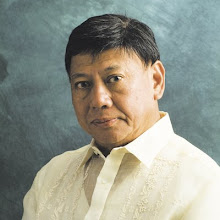May 17, 2007
The caption did not come from me. It was in the pastoral letter of Bishop Soc Villegas and 48 priests. The outraged people of Bataan are moving for a declaration of failure of election in the province. Their grounds? Cheating, harassment by goons, and massive vote buying on an unprecedented scale. And the deployment of Provincial police officers in escorting the vehicles used in vote buying. That, too, is unprecedented.
Allegations of cheating is old stuff. But election-related violence in Bataan is new. In Balanga alone, goons have broken into a house of a poll watcher and pointed guns at household members while taking away the watchers’ IDs. Four incidents of mauling and intimidation of the leaders of a mayoralty candidate are recorded in the blotter of the police. The people of Balanga were understandably alarmed. And now it can be told. Our most vocal candidate for Board Member was trailed by goons in the remote sitios of Morong, and while about to join the crowd for a big rally in the town a rifle shot narrowly missed him. These violence are unprecedented.
A candidate spending money for his ward leaders’ services is not news.
But what scandalized the decent elements of the people of Bataan was the massive scale money flowed in the dead of night of election eve. In Dinalupihan alone, my hometown, no less than P27 million was reported spent on D- Day, or a day before election day. The same amount was distributed in Orani. The price paid per voter ranged from a low of P500 to a high of P1700, with P300 bonus after voting. The voters of Balanga and Limay got the higher bonanza.
Vehicles roamed around towns till the wee hours of the morning of election day. They park the vehicles loaded with cash when they see people congregating. Those are their “seller” targets. Where there are no crowds, they go from house to house. In one barangay an ambulance was seen used because it could contain more bulky small denominated bills. But what was unprecedented was the use of police officers escorting the “buyers.” This was reported not only by the barangay folks but by PCRV patrol teams. Certainly, this must be investigated
And the manner that vote buying was conducted was brought up one notch higher in sophistication- a system was devised. Money wasn’t just given out. According to testimonies of recipients, a computer print-out of the name and precinct number of the voter was pasted on the sample ballot to which the P500 or P1000 bill was stapled. After voting he is supposed to write down the serial number of the actual ballot and present it to the vote- buyer who will give him the bonus. But the voter is then given a not too gentle reminder that he can be tracked down should he renege on his commitment. To complete the intimidation, photos of the voters receiving money were taken using cell phone cameras. Negative vote buying was also employed. Our supporters were paid not to leave their houses on election day. The ink on their finger and the presence of police officers were enough to enforce the bargain. The low voter turn –out proved it was effective. In my town, only a little more than 60% voted, with several barangays registering below 50%.
By this time, I am behind my opponent by 600 votes in my hometown. That is my bailiwick, where I used to get a 12,000 vote margin over my opponent. Admittedly, that election was more than 12 years ago. The political terrain may have shifted but it is the culture of politics that has dramatically changed. Then, we explained issues and talked platform of government. We spent for meetings and services of our leaders. That was enough to win votes. That was how I won twice over the incumbent Congressman and ran unopposed for my third term. That was how we recalled successfully our Governor.
But this time, it seems that every voter has to be bought. The situation is reprehensible but also sad. The poor who sell their votes are the victims in the transaction. They are no different from the poor and hungry who line up in town plazas for their 3-kilo rice dole-out so that they can eat. Rather than feel embittered, my understanding and sympathy flows out to them. It is the candidates who continue taking advantage of the poor instead of lifting them up from their penury that must enrage decent peoples.
Should this state of affairs continue, will we see the end of barangay caucuses and town meetings where issues are discussed by the candidates and heard by the people? In the last campaign, I averaged 7 public meetings a day, with the last meeting ending at 1 a.m. If I can rewind events to the start of the campaign, will we now change strategy and just match our opponents’ resources? The question is moot because we didn’t have the resources. But even if we did, that would be irresponsible. But sometimes I wonder if setting up vote-buying stations at street corners wouldn’t be easier and more effective?
